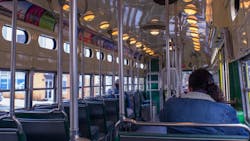With America beginning to reopen, are workers ready to jump back on public transit?
The answer to the headline's question, in short, is no. At least not according to a recent survey of 2,000 adults in the United States, in which 77 percent said they would feel uncomfortable riding public transit.
The survey was conducted April 27-28 by Qualtrics, a customer experience firm that is owned by SAP, to evaluate the public’s confidence level with returning to work and other “normal” ways of life. The survey found two out of three people are not comfortable returning to the workplace right now. That lack of confidence was shared by workers of all ages with more than 65 percent in every age group reporting that they were uncomfortable returning to work.
The high number of respondents expressing their lack of confidence in using public transit is in line with the survey’s overarching finding: People are not ready to interact with one another. In addition to the 77 percent that are not comfortable taking public transit, 75 percent reported feeling uncomfortable flying on an airplane.
To boost their confidence levels, respondents said they would like the assurance of public health officials and a readily available vaccine for the virus. Respondents would also like to see the following additional steps:
- 40 percent want masks to be mandatory for every passenger
- 38 percent want assigned seating with passengers spaced at least six feet apart
- 37 percent want the boarding and unloading of passengers done in a way that maintains separation
- 32 percent want the temperatures of passengers checked before they board
“While most organizations are looking at facts like hospitalization and testing rates as they reopen workplaces and businesses, it is equally important to understand perceptions—how people feel,” said Mike Maughan, head of global insights, Qualtrics. “Our study found that most Americans still feel uncomfortable returning to public spaces. Organizations will need to know what actions they can take to help customers and employees feel confident during this next phase of the pandemic.”
Transit system across the U.S. are strongly encouraging, and many are mandating, the use of face coverings for riders. At New York’s Metropolitan Transportation Authority, employees are undergoing temperature checks and the subway system will be shutdown nightly for enhanced cleaning efforts.
Technology is also coming into play. SkedGo tested an occupancy feature using data from Transport for New South Wales in Sydney, Australia, that allows riders to assess crowding levels before they travel so they can choose quieter routes and vehicles or switch to alternative forms of transport to maintain social distancing, such as cycling or e-scooters. The feature will be rolled out worldwide where data is available.
“We truly believe technology can be a force for good, providing information to reduce the risk of exposure to the virus and protect the safety of all transport users today and tomorrow,” said John Nuutinen, CEO, SkedGo.
About the Author

Mischa Wanek-Libman
Group Editorial Director
Mischa Wanek-Libman is director of communications with Transdev North America. She has more than 20 years of experience working in the transportation industry covering construction projects, engineering challenges, transit and rail operations and best practices.
Wanek-Libman has held top editorial positions at freight rail and public transportation business-to-business publications including as editor-in-chief and editorial director of Mass Transit from 2018-2024. She has been recognized for editorial excellence through her individual work, as well as for collaborative content.
She is an active member of the American Public Transportation Association's Marketing and Communications Committee and served 14 years as a Board Observer on the National Railroad Construction and Maintenance Association (NRC) Board of Directors.
She is a graduate of Drake University in Des Moines, Iowa, where she earned a Bachelor of Arts degree in Journalism and Mass Communication.
